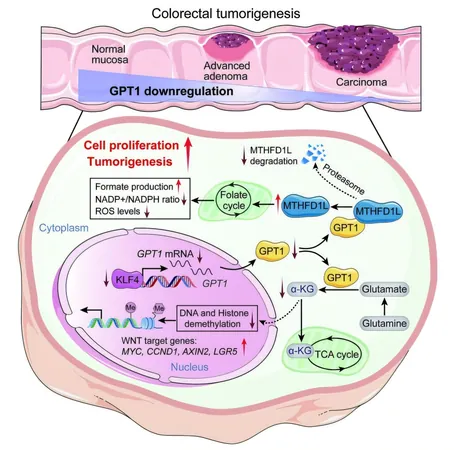
Groundbreaking Research Reveals How Mutant KRAS ctDNA Testing Could Transform Pancreatic Cancer Prognosis
2025-03-26
Author: Arjun
Introduction
In a revolutionary study conducted by researchers at the Mayo Clinic Comprehensive Cancer Center, it has been discovered that the presence of mutant KRAS (mKRAS) circulating tumor DNA (ctDNA) in blood and peritoneal fluid is a harbinger of worse outcomes for patients suffering from pancreatic ductal adenocarcinoma (PDAC). This pivotal finding could change how the disease is monitored and treated moving forward.
Study Overview
Lead investigator Dr. Mark Truty, a highly regarded pancreatic surgical oncologist, emphasized the importance of these findings, describing them as “a major advancement for pancreatic ductal adenocarcinoma.” He shed light on the fact that while ctDNA tests are routinely performed, their prognostic implications often remain ambiguous. "Our research indicates that a positive mKRAS test could suggest a significant likelihood of undetected metastatic disease, even when traditional imaging shows no signs of metastases,” Dr. Truty noted.
Implications for Treatment
The implications of this could be profound, especially for patients contemplating aggressive surgical options. The study outlines that those presenting with mKRAS positivity may require an extended course of neoadjuvant chemotherapy and should be counseled about the likelihood of surgical success based on predefined risk factors.
Methodology
Utilizing an advanced droplet digital PCR method, the team analyzed the mKRAS ctDNA of 785 non-metastatic PDAC patients from 2018 to 2022. By focusing on mKRAS mutations, which are found in nearly 90% of PDAC tumors but are rarely present in non-cancerous cells, the researchers were able to deliver targeted insights.
Key Findings
Among the 743 patients who underwent plasma testing for mKRAS, a significant 14% tested positive. Alarmingly, these patients experienced higher rates of postoperative recurrence and mortality within six months (46% versus 13% in mKRAS-negative patients), and a greater incidence of metastatic disease during follow-ups (78% compared to 49%). This suggests a clear link between mKRAS positivity in plasma samples and poor long-term outcomes.
Survival Rates
Further analysis revealed that survival was also drastically affected. Plasma mKRAS-positive patients had a median overall survival of just 13.3 months, whereas their mKRAS-negative counterparts enjoyed 26.9 months. The study established that positive plasma mKRAS status was independently correlated with a 2.24-fold increased risk of death.
Peritoneal Fluid Testing
The research also extended to peritoneal fluid testing. Among 419 patients analyzed, 29% tested positive for mKRAS, revealing a concerning correlation between positive results and an increased likelihood of metastatic disease (67% versus 42% in negative patients). Median survival was also impacted negatively in this group.
Combined Test Results
When considering the results from both plasma and peritoneal testing, patients showing mKRAS positivity in both samples had the worst prognosis, living an average of only 10 months. In contrast, those negative in both tests enjoyed the longest median overall survival at 28 months.
Optimizing Treatment Strategies
Dr. Truty stressed that to optimize treatment strategies, especially those involving surgery or radiation, it is essential to understand the risk of metastases through comprehensive testing. Accurate diagnosis plays a critical role as surgery is generally ineffective once metastasis has occurred.
Monitoring Treatment Response
Moreover, the study's findings have important implications for treatment monitoring. In a subset of 82 patients who underwent repeat testing, an impressive 91% of those who were initially positive saw their status change to negative following chemotherapy, indicating potential treatment efficacy. However, those who remained positive had a median survival of just seven months.
Future Prospects
The prospect of utilizing mKRAS ctDNA testing alongside emerging KRAS inhibitors brings new hope to PDAC patients, as ongoing clinical trials aim to leverage these tests for more personalized treatment regimens.
Conclusion
As the fight against pancreatic cancer continues, this groundbreaking research not only offers new tools for prognostication but may also pave the way for more effective and tailored therapies that could fundamentally alter patient outcomes.





 Brasil (PT)
Brasil (PT)
 Canada (EN)
Canada (EN)
 Chile (ES)
Chile (ES)
 Česko (CS)
Česko (CS)
 대한민국 (KO)
대한민국 (KO)
 España (ES)
España (ES)
 France (FR)
France (FR)
 Hong Kong (EN)
Hong Kong (EN)
 Italia (IT)
Italia (IT)
 日本 (JA)
日本 (JA)
 Magyarország (HU)
Magyarország (HU)
 Norge (NO)
Norge (NO)
 Polska (PL)
Polska (PL)
 Schweiz (DE)
Schweiz (DE)
 Singapore (EN)
Singapore (EN)
 Sverige (SV)
Sverige (SV)
 Suomi (FI)
Suomi (FI)
 Türkiye (TR)
Türkiye (TR)
 الإمارات العربية المتحدة (AR)
الإمارات العربية المتحدة (AR)